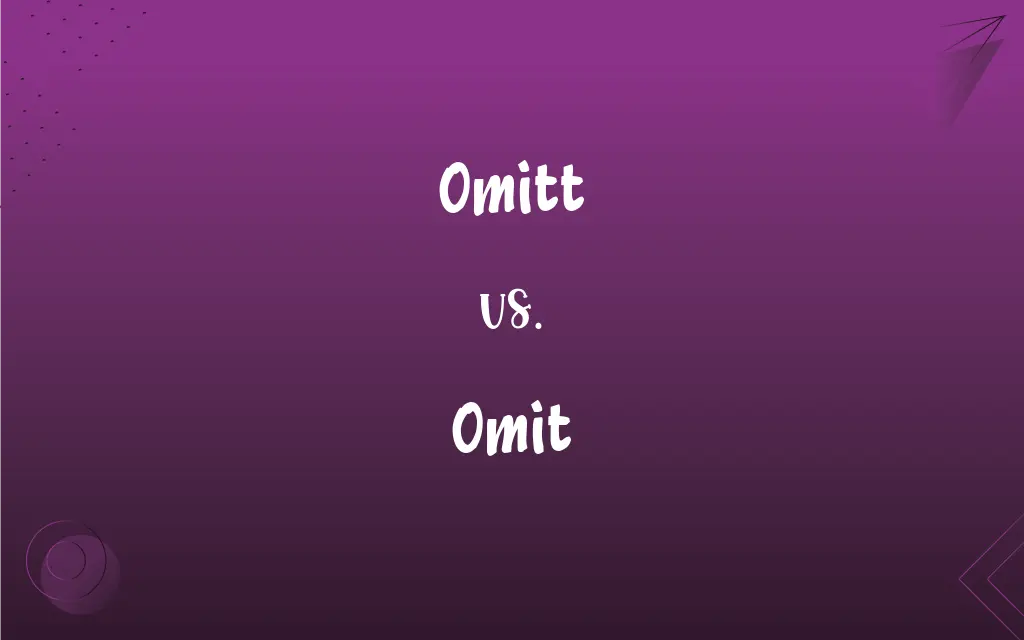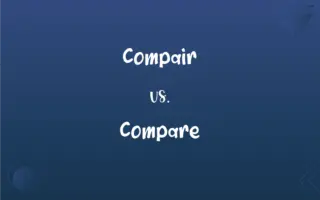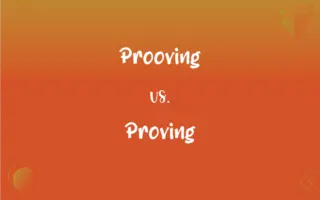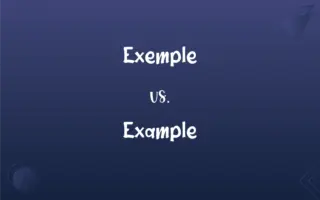Omitt vs. Omit: Mastering the Correct Spelling
Edited by Aimie Carlson || By Janet White || Updated on March 8, 2024
"Omitt" is incorrect, while "omit" is the correct spelling. "Omit" means to leave out or exclude something deliberately.

Which is correct: Omitt or Omit
How to spell Omit?

Omitt is Incorrect

Omit is Correct
ADVERTISEMENT
Key Differences
Remember, "omit" is shorter and more direct, like its action of excluding.
Visualize "omit" like "limit," with a single 't' at the end.
Associate "omit" with "commit," each having one 'm' and one 't'.
Link "omit" with "submit," both having a single 't'.
Recall "omit" as cutting something short, hence only one 't'.
ADVERTISEMENT
Correct usage of Omit
It's important not to omitt any steps in the recipe.
It's important not to omit any steps in the recipe.
Please don't omitt any details when you tell the story.
Please don't omit any details when you tell the story.
The author decided to omitt the last chapter from the final version.
The author decided to omit the last chapter from the final version.
Omit Definitions
To leave out or exclude.
She chose to omit that detail from her report.
Fail to mention or consider.
The article omits any mention of costs.
Not include, intentionally or forgetfully.
He omitted important facts from the story.
Skip or bypass.
In her hurry, she omitted a crucial step.
Exclude from a list or group.
His name was omitted from the guest list.
To fail to include or mention; leave out
Omitted an important detail from the report.
To fail or neglect to do (something)
Omitted his daily walk during our visit.
To fail or neglect (to do something)
I omitted to mention that I don't eat meat.
(transitive) To leave out or exclude.
(intransitive) To fail to perform.
To delete or remove; to strike.
To neglect or take no notice of.
To let go; to leave unmentioned; not to insert or name; to drop.
These personal comparisons I omit.
To forbear or fail to perform or to make use of; to leave undone; to neglect; to pass over.
Her father omitted nothing in her education that might make her the most accomplished woman of her age.
Prevent from being included or considered or accepted;
The bad results were excluded from the report
Leave off the top piece
Leave undone or leave out;
How could I miss that typo?
The workers on the conveyor belt miss one out of ten
Omit Sentences
She chose to omit her middle name from the application.
To simplify the dish, you can omit the less common ingredients.
If you omit sugar from your diet, you might lose weight.
The instructions omit mention of how much time is needed.
It's a common mistake to omit the accent in Spanish words.
The teacher asked the students to omit slang from their essays.
You can safely omit the background section in your presentation.
The report will be inaccurate if we omit these figures.
Don't omit any details when you explain the situation to the police.
To make the recipe vegan, omit the eggs and use a substitute.
The director chose to omit the controversial scene from the play.
In casual speech, people often omit the subject of the sentence.
Omit unnecessary words to make your writing more concise.
To save time, we'll omit the introduction and jump straight to the main point.
When recapping the meeting, make sure not to omit any key points.
The teacher advised to omit the paragraph that strays from the main topic.
FAQs
What is the pronunciation of omit?
It's pronounced as /oʊˈmɪt/.
Why is it called omit?
Derived from Latin 'omittere,' meaning to let go or neglect.
What is the verb form of omit?
"Omit" itself is the verb form.
What is the plural form of omit?
It remains "omit"; the word doesn't change.
Which preposition is used with omit?
"From" is commonly used, as in "omit from a list."
What is the root word of omit?
The root is from Latin 'omittere'.
Which vowel is used before omit?
Typically, no specific vowel is used directly before "omit."
Is omit a negative or positive word?
It's generally neutral, but context can give it a negative connotation.
Is omit an adverb?
No, it's not an adverb.
What is the singular form of omit?
"Omit" is both singular and plural.
Which article is used with omit?
Both "the" and "a" can be used, depending on the context.
Is omit an abstract noun?
No, it's a verb.
Is omit a vowel or consonant?
The word contains both vowels and consonants.
How many syllables are in omit?
There are two syllables.
Which determiner is used with omit?
Determiners like "the" or "a" can be used.
What is the third form of omit?
The third form is also "omitted."
Which conjunction is used with omit?
Conjunctions like "and" or "but" can be used.
Is the word omit imperative?
It can be used in the imperative form.
What is the second form of omit?
The second form is "omitted."
Is omit a collective noun?
No, it's not a collective noun.
How do we divide omit into syllables?
It's divided as o-mit.
What is a stressed syllable in omit?
The second syllable, 'mit,' is stressed.
What is another term for omit?
"Exclude" or "leave out" can be alternatives.
What is the opposite of omit?
"Include" is the opposite.
How is omit used in a sentence?
"Please omit any personal details from the report."
Is omit a noun or adjective?
It's a verb.
Is omit a countable noun?
No, as it's not a noun.
Is the omit term a metaphor?
It can be used metaphorically.
What part of speech is omit?
It's a verb.
What is the first form of omit?
The first form is "omit."
About Author
Written by
Janet WhiteJanet White has been an esteemed writer and blogger for Difference Wiki. Holding a Master's degree in Science and Medical Journalism from the prestigious Boston University, she has consistently demonstrated her expertise and passion for her field. When she's not immersed in her work, Janet relishes her time exercising, delving into a good book, and cherishing moments with friends and family.
Edited by
Aimie CarlsonAimie Carlson, holding a master's degree in English literature, is a fervent English language enthusiast. She lends her writing talents to Difference Wiki, a prominent website that specializes in comparisons, offering readers insightful analyses that both captivate and inform.

































































